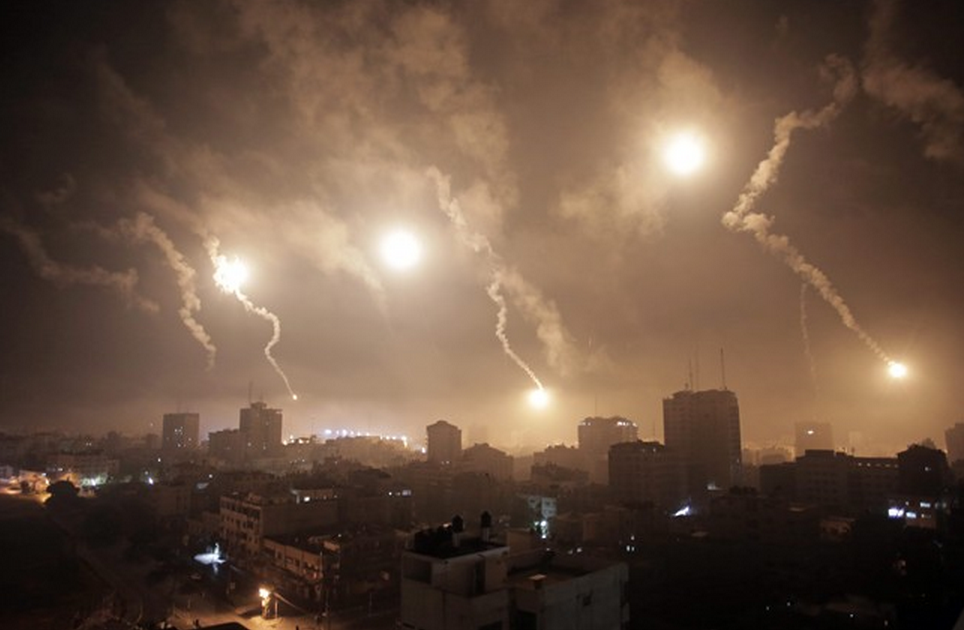It’s hard to imagine a Middle East conflict in which U.S. leadership is not front and centre in negotiating an end to hostilities.

But as the unending exchange of missiles between Israel and Hamas continues unabated, American leadership appears missing in action.
U.S. Secretary of State John Kerry’s failed ceasefire plan has been openly mocked in the Israeli press and by Israeli politicians.
And President Barack Obama, who endorsed the United Nations Security Council call, on Sunday, for an immediate humanitarian ceasefire, has not shown much appetite to intervene further.
Obama only answered a couple of questions after announcing more sanctions against Russia but was already walking away when a reporter asked him to respond to Israeli criticism of Kerry’s ceasefire plan.
That silence seems to suit the Israeli government
One official went so far as to tell Obama to mind his own business.
“Leave us alone; go focus on Syria,” Housing and Construction Minister Uri Ariel said in an interview with Army Radio.
READ MORE: Senior Palestinian official offers 24-hour truce in Gaza; Hamas wants demands met
New York Postcolumnist William McGurn, former President George W. Bush’s chief speechwriter, wrote last week that by the end of Obama’s presidency in 2017 “the Democratic Party he leaves behind will be one whose sympathies no longer embrace the Jewish state.”
Is Obama representing the opinion of those who voted for him?
But Obama may just be reflecting the views of those who voted for him.
Young people, African-Americans and Hispanics backed Obama in much bigger numbers than older, white voters in the 2008 and 2012 elections.
Those groups appear more likely to blame Israel for the current crisis, according to two recent polls, one released by Pew Research on Tuesday and one release Sunday by Gallup.
The Pew survey showed 29 per cent of people aged 18 to 29 blamed Israel: 21 per cent blamed Hamas, 14 per cent put the blame equally on both sides and 15 per cent of those surveyed didn’t know who bears responsibility.
Within the same age group, 29 per cent said Israel had “gone too far” and 31 per cent said the Israeli response was “about right.”
READ MORE: Iran’s supreme leader says Muslim world should help arm Gaza Palestinians
Gallup found a much wider gap: 51 per cent of its respondents between the ages of 18 and 29 said Israeli actions were not justified, compared to just 25 per cent who said they were.
Pew found 36 per cent of black respondents thought Israel had gone too far and 35 per cent of Hispanics felt the same way. Gallup found that 49 per cent on “nonwhite” respondents felt the same, compared to 50 per cent of white respondents who thought Israeli actions are warranted.
‘Telephone diplomacy’?
USA Today reported Obama has been busy working the phones regarding these international crises —”telephone diplomacy,” the publication called it.
In analyzing publicly disclosed phone records, USA Today found Obama has made 28 calls to world leaders so far in July, the most in a similar time period since winning a second term in the Oval Office and heads of state called to congratulate him.
Those included calls to allies such as the United Kingdom’s David Cameron and Germany’s Angela Merkel.
The most recent calls were was on Monday, when Obama spoke with Cameron, Merkel, Italian Prime Minister Matteo Renzi and France’s Francois Hollande to discuss sanctions against Russia as well as “the need for an immediate, unconditional cease-fire” in the Gaza Strip, USA Today reported, citing U.S. Deputy National Security Adviser Tony Bilken.




Comments